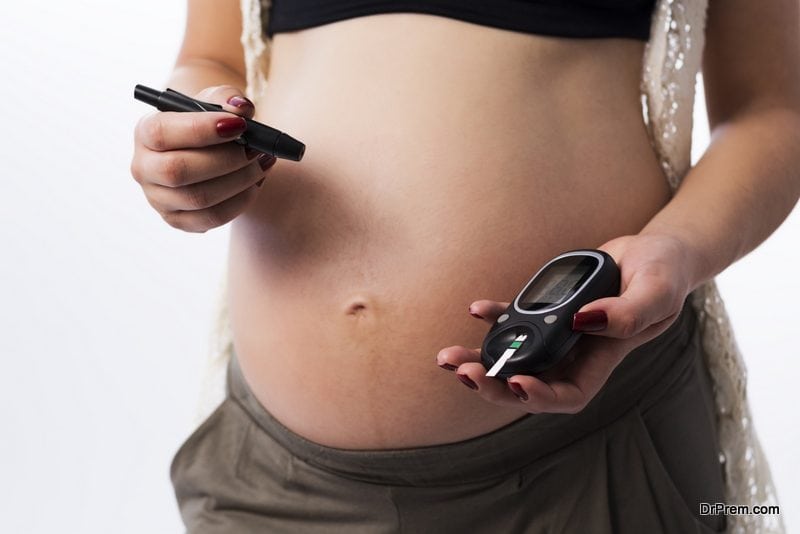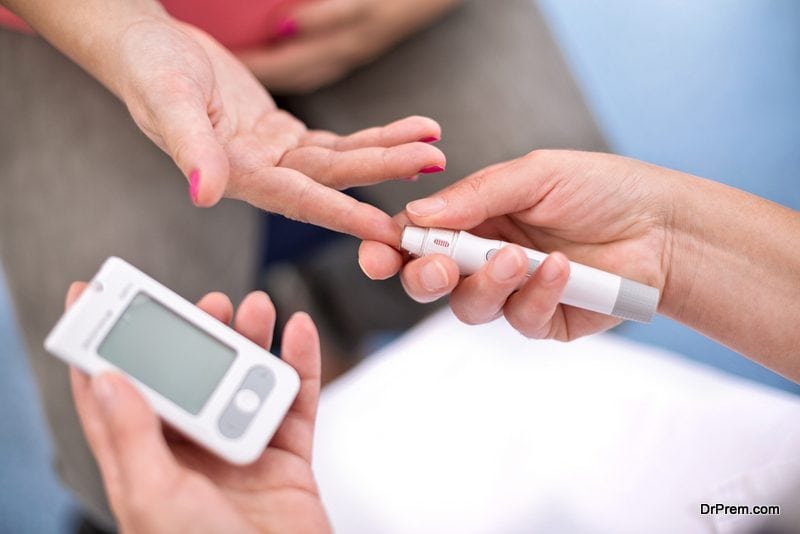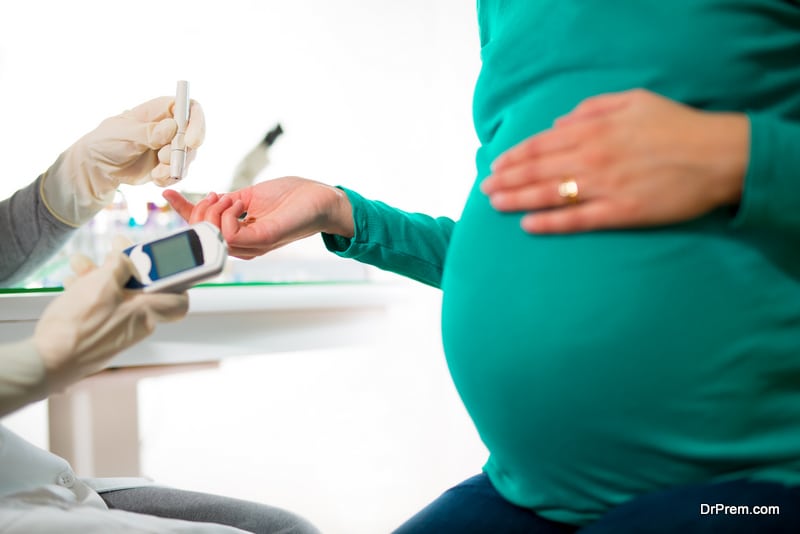Pregnancy brings with it plenty of uncalled for conditions along with the apparent discomfort of carrying a baby. One of the major physiological change occurring in this scenario is gestational diabetes. Gestational diabetes only occurs in pregnant women and not otherwise. Understanding gestational diabetes is not difficult.
A woman may either develop gestational diabetes for the first time during pregnancy or have a minor case of undiagnosed diabetes beforehand, which worsens while she is carrying a baby. In layman terms, gestational diabetes is one of the effects of pregnancy and physiological changes taking place in a woman’s body at that time.
Understanding gestational diabetes:

When a woman’s body is supporting a new life, it paves way for every little bit of nutrition to reach the foetus. In such a situation, the woman’s body develops a certain temporary resistance to insulin so that the necessary glucose is made available to the foetus in the womb. This ensures that not all of the glucose is taken up by the mother’s body and that the baby also benefits from it.
However, understanding gestational diabetes can be a little tricky. The mother’s body becomes altogether abnormally resistant to insulin or stops producingenough insulin to meet the required demand for glucose. In either case, the level of glucose in the blood rises, leading to gestational diabetes. 16% of all pregnant women around the world fall prey to gestational diabetes.
What are the risk factors for gestational diabetes?
 Number of factors may lead to gestational diabetes during pregnancy. However, the presence of certain risk factors increases your chances of falling prey to gestational diabetes considerably. Some of the risk factors for gestational diabetes are as follows:
Number of factors may lead to gestational diabetes during pregnancy. However, the presence of certain risk factors increases your chances of falling prey to gestational diabetes considerably. Some of the risk factors for gestational diabetes are as follows:
- Any prior history of diabetes may turn into gestational diabetes.
- Normally elevated blood glucose levels in a woman, but not high enough to be classified as diabetes, are also likely to result in gestational diabetes.
- Being overweight before or during pregnancy, or having a generally slow metabolism
- Previous occurrences of gestational diabetes in older pregnancies, or family history of type 2 diabetes.
- If a woman has previously miscarried her baby or has had a stillbirth before, she may be diagnosed with gestational diabetes while expecting.
- Hormonal disorders like PCOS or Polycystic Ovary Syndromemay cause an occurrence of gestational diabetes.
- Africans, Asians, Pacific Islanders, and Hispanic people and people of their descents are more likely to get gestational diabetes compared to those from the other races of the world.
- Age also plays a major factor in gestational diabetes in women. Women above the age of 25 are at a higher risk of gestational diabetes. The risk of gestational diabetes only increases with age.
- Giving birth to babies over 9 pounds of weight or having certain birth defects will quite possibly result in a case of gestational diabetes in the next pregnancy for the mother.
- Obesity, high blood pressure, and cardiovascular disorders are also a few of the highly underrated and overlooked aspects of understanding gestational diabetes in a pregnant woman.
Diet for gestational diabetes:
 Since gestational diabetes is nothing but a temporary condition, the dietary changes required to keep it under control are also temporary. When understanding gestational diabetes, the underlying aspect is to avoid foods that will raise your blood sugar. In simple terms, stay away from consuming a lot of complex carbs like rice and wheat since they make up 35-40% of the total blood sugar in your body.
Since gestational diabetes is nothing but a temporary condition, the dietary changes required to keep it under control are also temporary. When understanding gestational diabetes, the underlying aspect is to avoid foods that will raise your blood sugar. In simple terms, stay away from consuming a lot of complex carbs like rice and wheat since they make up 35-40% of the total blood sugar in your body.
35-40% of your blood sugar is made up of fat and the remaining 20% comes from proteins. Try and consume small meals at regular intervals all through the day so that your sugar level does not rise or fall drastically.
In addition to this, pregnant women with gestational diabetes are advised to undergo 30 minutes of intense to moderate training and physical exercise for at least 6 days a week to keep their health in check. Gestational diabetes in women is not as uncommon as it may seem, and can be kept well under control with the correct exercise and diet for gestational diabetes.
Treatment for gestational diabetes:
 The basic reason for the occurrence of gestational diabetes is that the expecting mother’s body fails to respond to the existing insulin. Or sometimes, the body stops producing insulin altogether. In either case, the standard treatment for gestational diabetes is to administer insulin shots to the lady. This may be done by the doctor or by the patient herself.
The basic reason for the occurrence of gestational diabetes is that the expecting mother’s body fails to respond to the existing insulin. Or sometimes, the body stops producing insulin altogether. In either case, the standard treatment for gestational diabetes is to administer insulin shots to the lady. This may be done by the doctor or by the patient herself.
In addition to this, the patient must keep a close check on their blood glucose levels so that it doesn’t fluctuate. The key is to keep monitoring the glucose levels by making the required dietary changes. Given your physical condition and the intensity of your gestational diabetes, your doctor may or may not prescribe medications for your treatment.
As per the ADA, American Diabetes Association, here are the normal ranges of your blood sugar levels that must be maintained on a daily basis:
- As soon as you wake up (on an empty stomach): 95 mg/dl or lower
- One hour post meal: 140 mg/dl or lower
- Two hours post meal: 120 mg/dl or lower
Anything above or beyond these ranges must be immediately brought to the notice of your doctor.
Conclusion:
In most cases, gestational diabetes usually occurs in the first trimester of pregnancy and is completely gone by the time the woman delivers the baby. Although the above studies show that gestational diabetes can be predicted, in some cases, this condition is not so easy to predict. However, an expecting woman must be prepared for such a condition, especially if her condition falls under the risk factors associated with understanding gestational diabetes and other such risks.
All in all, gestational diabetes is nothing but a temporary situation and it only gets better with time. For non-diabetic women, it is as good as the other physical changes occurring in her body like swollen feet and weight gain. In case you are diagnosed with gestational diabetes, never take any steps in terms of diet and medication without your doctor’s consent. Move only according to what your doctor prescribes, and it will be better than you’d imagine.


